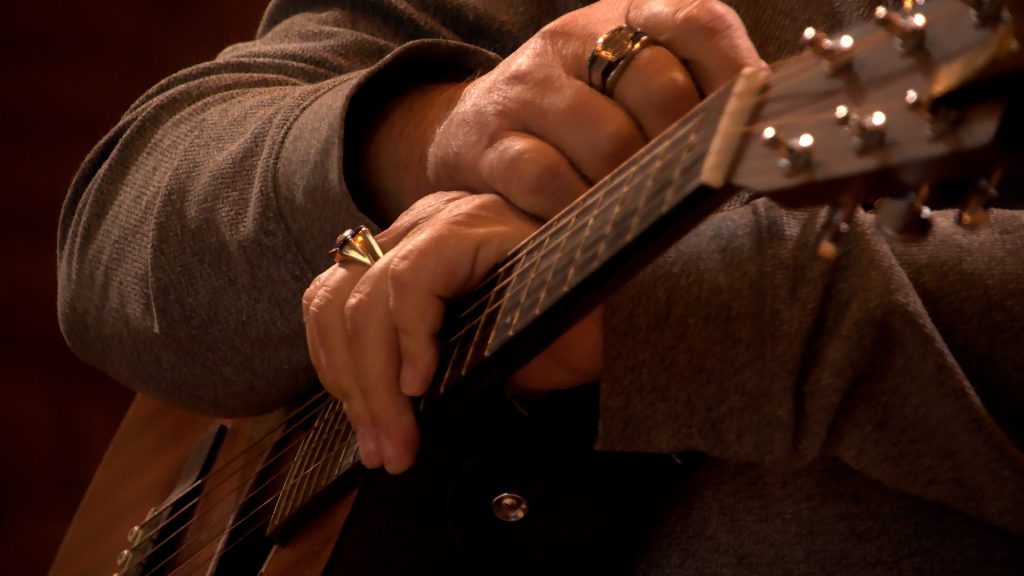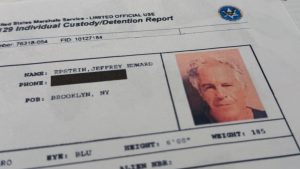How one Nebraska nonprofit is using music to treat veterans with PTSD

OMAHA, Neb. — Under the soft glow of stage lights, a circle of veterans gripped their guitars, faces set with focus. The melody of “Blue Christmas” drifted through the room — some notes faltered, others rang clear — but every sound carried something deeper than music. At the center, a woman sang, her voice steady and warm as she guided the guitarists through the song. Each chord drew the group closer together.
When veterans return from service, the battle doesn’t always end on the battlefield. Many carry invisible wounds — among them post-traumatic stress disorder (PTSD), which affects 7% of all veterans, according to the U.S. Department of Veterans Affairs.
Veterans grappling with PTSD can experience intrusive memories, anxiety, depression, difficulty sleeping and a sense of emotional numbness. This can lead to sobering realities: In 2022, the suicide rate among veterans was 34.7 per 100,000, roughly double that of non-veteran adults. Among those veterans who died by suicide, 40% had a mental-health or substance-use diagnosis, and 40% of those also had PTSD.
Traditional treatments — therapy, medication and counseling — are essential. However, there’s a growing movement to explore different paths to healing. One of the most promising approaches? Music therapy.

The healing power of music
Music therapy isn’t just a creative outlet — it’s a clinically recognized approach that helps alleviate PTSD symptoms. By engaging multiple brain regions simultaneously, music can stimulate neural pathways, enhance emotional regulation, improve mood, lower anxiety and foster social connection, according to a 2025 study by the research organization, RAND. The study found that expressive art therapies, including music, have shown small to moderate benefits in reducing PTSD and depressive symptoms among veterans.
“The brain is the hardware and the mind and thoughts are the software,” said music therapist Mack Bailey. “If the hardware is not working well, then the software is not going to work well.”
Music helps strengthen that hardware by calming the nervous system, improving focus and unlocking emotions stored within trauma, Bailey told SAN.
“Music is the only modality that incorporates both sides of the brain simultaneously,” he said.
It’s more than a theory. A 2023 BMC Psychology study found that veterans who participated in guitar-based music instruction saw PTSD symptoms drop by an average of 21%, depression by 27% and overall quality of life improve by 37%.
In Omaha, Nebraska, a small nonprofit called Hero’s Encore is bringing this research to life.
Hero’s Encore: A symphony of healing
Air Force veteran Taylor Ullom founded Hero’s Encore after her own personal struggle with PTSD.
“I had a severe PTSD crisis,” Ullom told SAN.
Unbiased. Straight Facts.TM
About 6% of U.S. adults are diagnosed with PTSD; that number jumps to 15% for paramedics and over 23% for military service members.

”Just lying there on the floor contemplating life, and in that place, I just began to think about my children, the legacy I would be leaving them,” she said. “Going back to my birth father, who was a Vietnam vet, he succumbed to PTSD by suicide when I was 3.”
Ullom wondered how she could help build a world where people are given the tools to change the statistics. Then she got to work, building Hero’s Encore, a nine-month program that combines one-on-one music instruction, songwriting and public performance.
“It’s a music program, you know, but it’s also a resiliency program where, through each level, we’re also addressing neuroplasticity,” Ullom told SAN. “You’re growing new neural pathways. With that, also, you’re learning a new discipline and you’re kind of easing your way back into social atmospheres.”
A three-stage journey
Participants begin with one-on-one guitar lessons. This foundational phase focuses on building confidence, learning chords, strumming techniques and playing beginner songs in a group.
From there, vets move to the second stage, in which they explore songwriting, jam sessions and workshops. This provides tools for self-expression and emotional growth.
“I don’t want you to come in and write about the worst thing this ever happened to you,” Ullom said. “Some people feel compelled to do that as part of their own healing, but it is about teaching our heroes how to view life from different perspectives, how to view it from a different filter.”
Then comes the final stage: performance. Here, they experience “good stress” in public settings. The goal is to train the body to handle pressure positively, using music as the bridge to confidence, community engagement and post-traumatic growth.
It’s not exactly the battlefield. But the stakes can still feel high.
“Day one, I tell everybody good stress is still stress, and a dysregulated nervous system can’t tell the difference,” Ullom told SAN.
From the frontlines of healing
For Hero’s Encore instructor Byran Carroll, the program became an unexpected lifeline. After multiple deployments with the Army and struggling with alcohol as a coping mechanism, he found a new purpose in teaching guitar to fellow veterans.
“Being able to be immersed with veterans again, you just have that brotherhood, and that camaraderie, it’s just something you don’t experience anywhere else,” Carroll told SAN. “And then being able to play music with each other on top of that, it just, it really, truly is just wonderful.”
And he isn’t alone. Jake Gouger, a Marine Corps veteran, told SAN that music has transformed the way he copes with stress and anger.
“It’s been really good for me,” Gouger said. “When I’m playing music, I’m not focused on some of the mental health problems I have or, you know, what’s going on in life. I’m just focused on learning the craft. And so it’s been really positive and it’s been a really good coping mechanism.”
Both Carroll and Gouger highlighted the value of being around other veterans they can identify with.
“Being able to teach music to somebody else is just super fulfilling,” Carroll said. “There’s just a lot of relatability with each other.”
Even for older veterans, the impact is profound. Patricia Whitebear, a Navy veteran, joined the program to pursue her dream of playing the guitar.
“It brought out another side of my temperament and my personality,” Whitebear told SAN. “I think it made me feel that I had more value than just being a person there. I had a talent that I’m going to explore.”

The science meets the soul
Bailey said the secret lies in what music therapists call the iso principle — meeting someone emotionally where they are, then gently guiding them forward through sound.
“If somebody’s feeling depressed, or anger or anxiety, you don’t just play a happy song and everything’s better,” Bailey said. “You have to start where they are, then lead that person to where they want to be.”
That philosophy mirrors Hero’s Encore’s practice of meeting every veteran where they are — helping to move them through rather than forcing them to move on.
A different kind of encore
Hero’s Encore is tailored for veterans, first responders and transitioning service members. The full experience — from equipment to performance opportunities — costs the nonprofit about $5,000 per participant. The nonprofit relies on volunteers, skilled instructors and funding to sustain its mission.
Ullom’s vision is ambitious. She hopes to eventually bring Hero’s Encore nationwide, pairing participants with orchestras, recording their music and even touring to spread the message that music and community can heal trauma.
When veterans take the stage at a Hero’s Encore showcase, they’re not just playing music — they’re reclaiming their voices. Every chord strummed, every lyric sung, is a reminder that they’ve survived, that they still have more to share.
For many, the encore isn’t about the applause.
It’s about being heard.
The post How one Nebraska nonprofit is using music to treat veterans with PTSD appeared first on Straight Arrow News.





